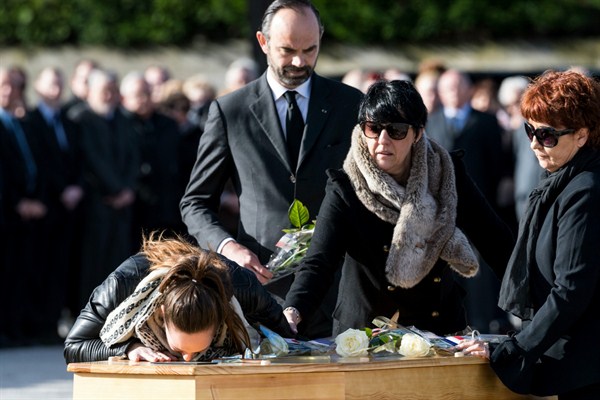PARIS—Last Friday, a gunman hijacked a car near the city of Carcassonne, in southwestern France, before shooting at national police officers finishing up a morning run. He then headed to the nearby town of Trebes, where he opened fire in a supermarket and held shoppers and employees hostage for several hours. By the time police arrived at the scene, three had died: two supermarket hostages and a passenger in the hijacked car. The following day, Arnaud Beltrame, a 44-year-old lieutenant colonel in the French police who used his body as a shield to protect one of the hostages, died of his injuries. Police killed the gunman, 25-year-old Redouane Lakdim, who had pledged allegiance to the self-proclaimed Islamic State.
The incident was the latest in what has become a new era of terrorism on French soil, and the second since President Emmanuel Macron took office. In October, a man stabbed two girls to death at a Marseille train station in what officials called “a likely terrorist attack.” As the details of Friday’s attack, for which the Islamic State claimed responsibility, trickled in, they seemed to accord with a familiar pattern. Lakdim, a Moroccan who earned French citizenship in 2004, had since 2014 been on the official “Fiche S” list, which includes some 26,000 individuals considered a potential threat to national security. Ten thousand of those individuals have apparently been radicalized, with the most dangerous monitored directly by the intelligence agency known by its acronym DGSI.
It’s not the first time a dual-citizen on the radar of French authorities has perpetrated an attack in France. Prison officials had noted that Amedy Coulibaly, the French-Malian who killed four people at a kosher supermarket in Paris in January 2015, had been radicalized in prison, but they failed to share that information with the DGSI. That agency had also been tracking French-Algerian Said Kouachi, who killed 12 people at the Paris offices of the satirical magazine Charlie Hebdo days before the supermarket attack, but had stopped monitoring him when he moved from Paris to Reims, in northern France. And despite a travel ban, Samy Amimour, a French-Algerian who was among the perpetrators of the November 2015 attack at the Bataclan theater on a night of coordinated terrorist attacks in the French capital, traveled freely to Syria in 2013. Nearly all had a history of petty crime; none were particularly religious, but they were radicalized fairly quickly.

